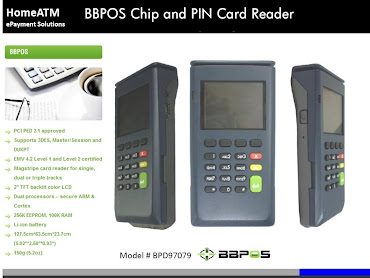Chip debit cards and terminals begin to rollout across Canada
TORONTO, Oct. 28 /CNW/ - INTERAC, Canada's national debit network and leading payment brand, today announced the start of the national rollout of chip technology, a new generation of payment card technology that will combatdebit card fraud and the production of counterfeit cards.
"INTERAC is committed to providing the most secure and innovative financial services network," said Mark O'Connell, President and CEO, Interac Association. "By putting the power of a computer onto the debit card, chip technology will enhance security and enable new INTERAC product offerings that continue to keep Canadians connected to their money."
Beginning this fall, members of the Interac Association will begin to distribute chip debit cards to their customers. As well, members will continue to replace Automated Banking Machines (ABMs) and retail terminals withchip-enabled devices, a process currently underway. Each financial institution and payment processor has its own timeline in place for the distribution of cards and terminals across Canada; therefore the introduction of chip technology will vary from one organization to another.
The complete migration to chip technology will take a number of years, given the vast number of debit cards, ABMs and store terminals across Canada that must be upgraded. Interac Association has set transition requirements to ensure that the majority of Canadians will be able to fully benefit from this new technology by 2010, at which point the majority of ABMs and debit cards will be converted.
"Interac Association has put appropriate deadlines in place for the transition to occur in normal business cycles," said O'Connell. "Magnetic stripe transactions will no longer be accepted at ABMs after 2012 and at store terminals after 2015. These timelines will ensure a timely transition, while also ensuring a smooth transition for our members and for merchants."
Chip debit cardholders will experience only a minor change in the way they interact with the store terminal. When conducting a chip debit transaction, cardholders will no longer swipe the card through the machine. Instead, cardholders will insert their debit card chip first into the terminal and leave it in the device for the duration of the transaction, following the prompts and entering their PINs, just as they do today.
Chip cards will continue to carry the magnetic stripe, not only to facilitate the chip transition period, but also to allow cardholders to use their debit cards in other countries that do not use chip technology. (Editor's Note: and to allow fraudsters to clone cards :)
"INTERAC is committed to providing the most secure and innovative financial services network," said Mark O'Connell, President and CEO, Interac Association. "By putting the power of a computer onto the debit card, chip technology will enhance security and enable new INTERAC product offerings that continue to keep Canadians connected to their money."
Beginning this fall, members of the Interac Association will begin to distribute chip debit cards to their customers. As well, members will continue to replace Automated Banking Machines (ABMs) and retail terminals withchip-enabled devices, a process currently underway. Each financial institution and payment processor has its own timeline in place for the distribution of cards and terminals across Canada; therefore the introduction of chip technology will vary from one organization to another.
The complete migration to chip technology will take a number of years, given the vast number of debit cards, ABMs and store terminals across Canada that must be upgraded. Interac Association has set transition requirements to ensure that the majority of Canadians will be able to fully benefit from this new technology by 2010, at which point the majority of ABMs and debit cards will be converted.
"Interac Association has put appropriate deadlines in place for the transition to occur in normal business cycles," said O'Connell. "Magnetic stripe transactions will no longer be accepted at ABMs after 2012 and at store terminals after 2015. These timelines will ensure a timely transition, while also ensuring a smooth transition for our members and for merchants."
Chip debit cardholders will experience only a minor change in the way they interact with the store terminal. When conducting a chip debit transaction, cardholders will no longer swipe the card through the machine. Instead, cardholders will insert their debit card chip first into the terminal and leave it in the device for the duration of the transaction, following the prompts and entering their PINs, just as they do today.
Chip cards will continue to carry the magnetic stripe, not only to facilitate the chip transition period, but also to allow cardholders to use their debit cards in other countries that do not use chip technology. (Editor's Note: and to allow fraudsters to clone cards :)
About Interac Association














